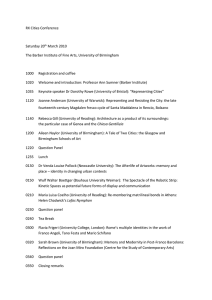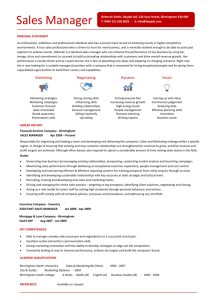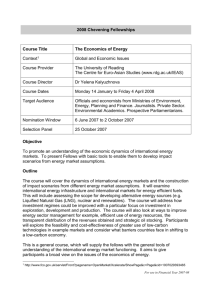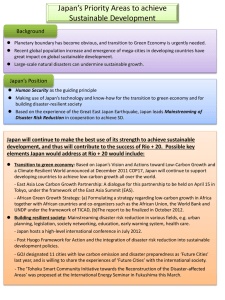Centre for science
advertisement
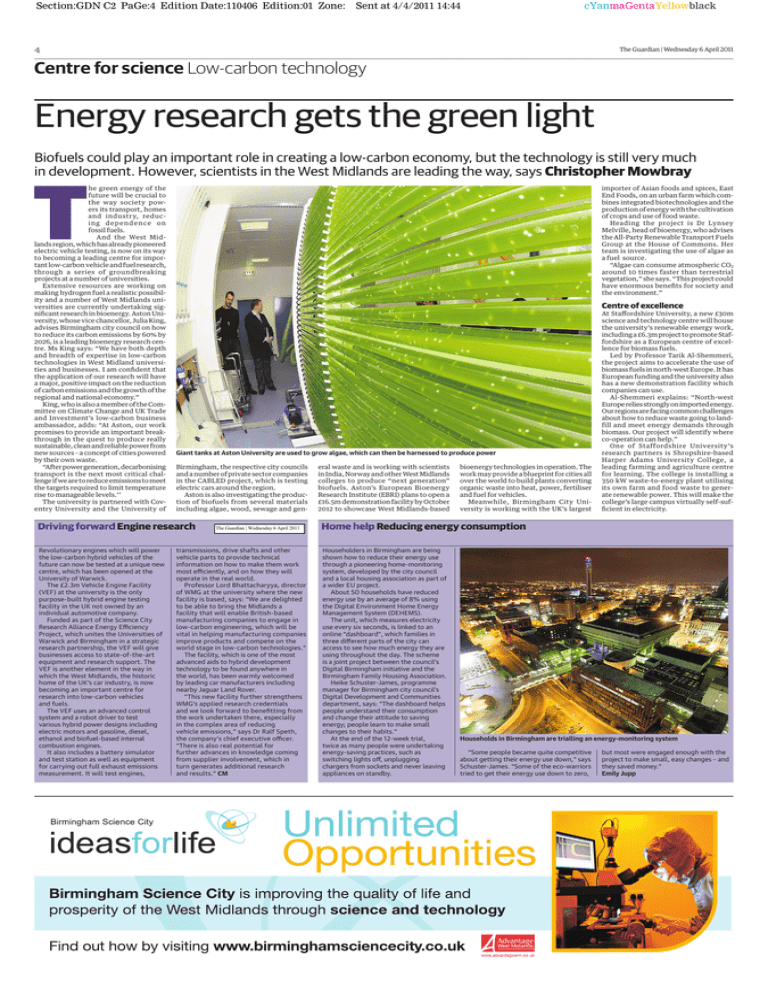
Section:GDN C2 PaGe:4 Edition Date:110406 Edition:01 Zone: Sent at 4/4/2011 14:44 cYanmaGentaYellowblack 4 The Guardian | Wednesday 6 April 2011 Centre for science Low-carbon technology Energy research gets the green light Biofuels could play an important role in creating a low-carbon economy, but the technology is still very much in development. However, scientists in the West Midlands are leading the way, says Christopher Mowbray T he green energy of the future will be crucial to the way society powers its transport, homes and industry, reducing dependence on fossil fuels. And the West Midlands region, which has already pioneered electric vehicle testing, is now on its way to becoming a leading centre for important low-carbon vehicle and fuel research, through a series of groundbreaking projects at a number of universities. Extensive resources are working on making hydrogen fuel a realistic possibility and a number of West Midlands universities are currently undertaking significant research in bioenergy. Aston University, whose vice chancellor, Julia King, advises Birmingham city council on how to reduce its carbon emissions by 60% by 2026, is a leading bioenergy research centre. Ms King says: “We have both depth and breadth of expertise in low-carbon technologies in West Midland universities and businesses. I am confident that the application of our research will have a major, positive impact on the reduction of carbon emissions and the growth of the regional and national economy.” King, who is also a member of the Committee on Climate Change and UK Trade and Investment’s low-carbon business ambassador, adds: “At Aston, our work promises to provide an important breakthrough in the quest to produce really sustainable, clean and reliable power from new sources – a concept of cities powered by their own waste. “After power generation, decarbonising transport is the next most critical challenge if we are to reduce emissions to meet the targets required to limit temperature rise to manageable levels.’’ The university is partnered with Coventry University and the University of importer of Asian foods and spices, East End Foods, on an urban farm which combines integrated biotechnologies and the production of energy with the cultivation of crops and use of food waste. Heading the project is Dr Lynsey Melville, head of bioenergy, who advises the All-Party Renewable Transport Fuels Group at the House of Commons. Her team is investigating the use of algae as a fuel source. “Algae can consume atmospheric CO2 around 10 times faster than terrestrial vegetation,” she says. “This project could have enormous benefits for society and the environment.” Centre of excellence Giant tanks at Aston University are used to grow algae, which can then be harnessed to produce power Birmingham, the respective city councils and a number of private sector companies in the CABLED project, which is testing electric cars around the region. Aston is also investigating the production of biofuels from several materials including algae, wood, sewage and gen- Driving forward Engine research Revolutionary engines which will power the low-carbon hybrid vehicles of the future can now be tested at a unique new centre, which has been opened at the University of Warwick. The £2.3m Vehicle Engine Facility (VEF) at the university is the only purpose-built hybrid engine testing facility in the UK not owned by an individual automotive company. Funded as part of the Science City Research Alliance Energy Efficiency Project, which unites the Universities of Warwick and Birmingham in a strategic research partnership, the VEF will give businesses access to state-of-the-art equipment and research support. The VEF is another element in the way in which the West Midlands, the historic home of the UK’s car industry, is now becoming an important centre for research into low-carbon vehicles and fuels. The VEF uses an advanced control system and a robot driver to test various hybrid power designs including electric motors and gasoline, diesel, ethanol and biofuel-based internal combustion engines. It also includes a battery simulator and test station as well as equipment for carrying out full exhaust emissions measurement. It will test engines, The Guardian | Wednesday 6 April 2011 transmissions, drive shafts and other vehicle parts to provide technical information on how to make them work most efficiently, and on how they will operate in the real world. Professor Lord Bhattacharyya, director of WMG at the university where the new facility is based, says: “We are delighted to be able to bring the Midlands a facility that will enable British-based manufacturing companies to engage in low-carbon engineering, which will be vital in helping manufacturing companies improve products and compete on the world stage in low-carbon technologies.” The facility, which is one of the most advanced aids to hybrid development technology to be found anywhere in the world, has been warmly welcomed by leading car manufacturers including nearby Jaguar Land Rover. “This new facility further strengthens WMG’s applied research credentials and we look forward to benefitting from the work undertaken there, especially in the complex area of reducing vehicle emissions,” says Dr Ralf Speth, the company’s chief executive officer. “There is also real potential for further advances in knowledge coming from supplier involvement, which in turn generates additional research and results.” CM eral waste and is working with scientists in India, Norway and other West Midlands colleges to produce “next generation” biofuels. Aston’s European Bioenergy Research Institute (EBRI) plans to open a £16.5m demonstration facility by October 2012 to showcase West Midlands-based bioenergy technologies in operation. The work may provide a blueprint for cities all over the world to build plants converting organic waste into heat, power, fertiliser and fuel for vehicles. Meanwhile, Birmingham City University is working with the UK’s largest At Staffordshire University, a new £30m science and technology centre will house the university’s renewable energy work, including a £6.3m project to promote Staffordshire as a European centre of excellence for biomass fuels. Led by Professor Tarik Al-Shemmeri, the project aims to accelerate the use of biomass fuels in north-west Europe. It has European funding and the university also has a new demonstration facility which companies can use. Al-Shemmeri explains: “North-west Europe relies strongly on imported energy. Our regions are facing common challenges about how to reduce waste going to landfill and meet energy demands through biomass. Our project will identify where co-operation can help.” One of Staffordshire University’s research partners is Shropshire-based Harper Adams University College, a leading farming and agriculture centre for learning. The college is installing a 350 kW waste-to-energy plant utilising its own farm and food waste to generate renewable power. This will make the college’s large campus virtually self-sufficient in electricity. Home help Reducing energy consumption Householders in Birmingham are being shown how to reduce their energy use through a pioneering home-monitoring system, developed by the city council and a local housing association as part of a wider EU project. About 50 households have reduced energy use by an average of 8% using the Digital Environment Home Energy Management System (DEHEMS). The unit, which measures electricity use every six seconds, is linked to an online “dashboard”, which families in three different parts of the city can access to see how much energy they are using throughout the day. The scheme is a joint project between the council’s Digital Birmingham initiative and the Birmingham Family Housing Association. Heike Schuster-James, programme manager for Birmingham city council’s Digital Development and Communities department, says: “The dashboard helps people understand their consumption and change their attitude to saving energy; people learn to make small changes to their habits.” At the end of the 12-week trial, twice as many people were undertaking energy-saving practices, such as switching lights off, unplugging chargers from sockets and never leaving appliances on standby. Households in Birmingham are trialling an energy-monitoring system “Some people became quite competitive about getting their energy use down,” says Schuster-James. “Some of the eco-warriors tried to get their energy use down to zero, but most were engaged enough with the project to make small, easy changes – and they saved money.” Emily Jupp


